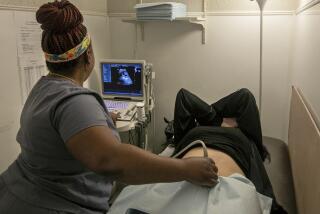Testing Infants for HIV Status
- Share via
* I share the concern which prompted The Times to decry the cessation of the Centers for Disease Control’s blind HIV testing of infants (editorial, May 15). I also share you belief that prenatal testing is preferable to newborn testing both in terms of accuracy and treatment potential. However, I disagree with your dismissal of my efforts to allow mothers to know the results of HIV tests given to their newborn children.
The impact of continuing to withhold the results of HIV tests, as measured by the number of children who needlessly contract a deadly disease and the number of mothers who are tormented by the suffering of their children, is an outcome that cannot be so easily dismissed. The editorial’s clarification that infant HIV tests reveal the antibody status of an infant’s mother and not the infant does not alter the fact that California is privy to information that can save or improve the lives of children. Nor does this fact ameliorate the state’s unconscionable failure to impart that information.
As the editorial noted, three-quarters of these infants will show no signs of the HIV virus at later tests, if proper precautions are taken. The editorial failed to note, however, that these precautions, such as not breast-feeding, cannot be taken if a mother is unaware of these test results. The editorial also greatly underestimates the rate of transmission via breast-feeding at 1% to 2%. According to the Pediatric AIDS Foundation, the rate of transmission is typically 14% and can climb to twice that or higher if a mother becomes infected after conception.
For the remaining one-quarter of infants who test positive because of an actual infection, failing to provide this information will leave them easy prey for the diseases that are symptomatic of AIDS as well as live-virus vaccinations that would flourish in their weakened immune system.
California would be party to all of these impacts if blind testing were to continue. If the cloud of canceling these tests has a silver lining, it is that we are no longer contributing to this morally corrupt policy that is a modern-day analogue to the Tuskegee Study.
Finally, I found your assertion that infection in newborns is “relatively rare” to be surprising, considering that AIDS has become the seventh leading cause of death among children.
Despite these differences with The Times’ position, I applaud its emphasis on expanding prenatal testing. While the demise of this infant HIV testing is an unfortunate outcome, perhaps it will allow all sides in this contentious issue to come together and call for an aggressive expansion of prenatal testing.
TIM LESLIE
State Senate, R-Carnelian Bay






